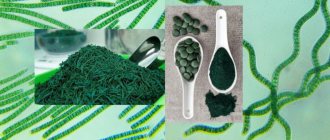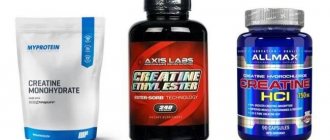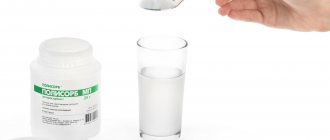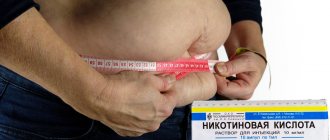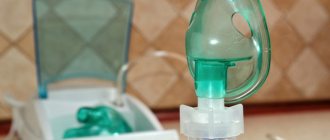Translated by: Avramov Maxim - lover of healthy lifestyle and author of the website ilovemysport.ru Place in the ranking of authors: 34
(become an author) Date: 2020-06-02 Views: 8,645 Rating: 5.0
| All articles by the author >> | Medals articles >> |
Articles are loading...
Typically, creatine is considered as a sports supplement that promotes muscle growth and performance. But is it worth taking creatine for weight loss?
You might think that we know everything about this sports supplement. How else? Thousands of articles and studies have been published about creatine. But today we will try to look at this sports nutrition from a different perspective. No muscle growth or performance improvement. This sports supplement is a great addition to your diet. So, how to take creatine for weight loss?
What is creatine
This is a substance that is a nitrogen-containing compound. In the field of food biochemistry it is known as non-protein nitrogen. The body can get creatine from food (meat and fish) or produce it independently with the help of the liver and kidneys from amino acids (arginine, glycine and methionine). It is worth noting that most of the beneficial substances contained in food are destroyed during its preparation. For this reason, bodybuilders need to take special supplements that help build muscle mass.
Properties
Creatine monohydrate is a protein that is characterized by an anabolic effect. According to Wikisport, it helps build muscle and increase body weight, both for men and women. Some athletes claim that this supplement provides effective protection against neurological diseases. Other benefits of creatine:
- promotes rapid recovery after training;
- improves performance;
- has a beneficial effect on brain function;
- Helps the body produce ATP (adenosine triphosphate).
Action
The supplement has a complex effect on the body. When performing high-intensity exercise, its main role is to increase phosphocreatine stores in the muscles. This substance helps the body produce more ATP, which is the main source of energy. Many people believe that they need to take creatine for weight loss, but in this case it is not very effective. However, the drug saturates the body with protein, thanks to which the athlete is able to train with double strength . Creatine supplements also help:
- increase endurance;
- increase the number of anabolic hormones (IGF-1);
- hydrate cells (increase their water content);
- reduce protein breakdown in tissues;
- lower myostatin levels.
Contraindications
For years, athletes have avoided taking creatine monohydrate due to side effects. The use of the supplement was believed to cause the following harm:
- it causes dehydration;
- disrupts the water-salt balance;
- promotes gastrointestinal disorders;
- has a negative effect on the kidneys and liver;
- causes hyperemia (overflow of blood vessels).
Over the past ten years, studies have been conducted on innovative equipment that have not been able to confirm these rumors. The only side effect of creatine is weight gain (due to increased water concentration inside cells). For many athletes who want to create a beautiful body contour, this is what they need. However, it is worth noting that when losing weight, this fact can serve as an obstacle.
Benefits of taking creatine for weight loss
The process of losing weight is stressful for any person. During stress, cortisol is released, which negatively affects the body. Chronic stress not only destroys memory, but is also one of the causes of Alzheimer's. Therefore, do not forget to monitor your blood cortisol levels.
As we wrote above, creatine protects the brain. A deficiency of this supplement can cause serious health problems. Let's take a quick look at the benefits of taking creatine.
1. Fighting deficits. When losing weight, you are at risk because you are deficient in calories and nutrients. Your dietary intake will likely reduce your intake of creatine-rich foods, such as red meat. The fewer calories you eat, the further you move away from your daily creatine requirement.
Creatine supplements have also been shown to have anti-catabolic effects. They monitor the nitrogen balance in the muscles and reduce the risk of muscle tissue destruction.
This sports nutrition enhances the stimulation of neuromuscular signal transmission processes. If you are worried about losing muscle mass while losing weight, creatine is the best remedy to combat this problem.
2. Recovery after training. This issue is especially acute when you are on a diet. We have already established that creatine plays an important role in post-workout metabolism, muscle protein synthesis, and the recovery process. This is another benefit of creatine. It protects the body from loss of muscle mass while you struggle with the amount of calories you consume. Creatine is an essential sports supplement that protects you as you lose weight.
This is especially important when you are working with the basic Stress-AdaptationModel. It is recovery that is the most important and at the same time the most underestimated variable. In other words, if creatine can improve the recovery process after training, then the game is definitely worth the candle.
3. Health and well-being. In theory, the process of taking this sports supplement should be safer than dietary intake or the endogenous process. Endogenous substances and processes originate from a system, such as an organism, tissue or cell. If the body does not obtain creatine through conversion or synthesis, compounds such as homocysteine and ademetionine (S-adenosylmethionine) may be damaged.
Excess of these substances increases the risk of nervous and cardiovascular diseases. Fortunately, taking creatine orally can combat these problems.
Considering the fact that creatine acts as an antioxidant and, despite all concerns, does not harm the body, this sports nutrition is a great way to improve health and take care of your well-being. All this is extremely necessary against the background of a diet, when the body suffers from stress and lack of calories.
How to take creatine monohydrate
You should not drink creatine for weight loss, because it will not give the desired effect. The main purpose of taking the supplement is to saturate the muscles with a useful substance to build mass. To get the desired result, you need to follow the instructions and not exceed the norm. How to take creatine correctly? A reasonable dose of the drug is 20 grams per day. The daily portion should be divided into four doses of 5 g. It is best to consume protein during the week with foods rich in protein or monounsaturated fats (fish, meat). This will speed up the absorption of the supplement.
Reception on drying
There is no clear answer to the question of whether it is possible to take creatine while cutting.
But 20 years ago, all bodybuilders knew that creatine during cutting was contraindicated for them.
At that time, only monohydrate was used; there were simply no other types. This variety is famous for the fact that it can greatly retain water in the body.
For competitive bodybuilders, the last phase of drying is “draining” the water.
In other words, a week before the competition, bodybuilders deliberately dehydrate their body through various manipulations (taking special medications, limiting fluid intake).
At the same time, all foods that can retain water in the body are excluded from the diet. First of all, this is salt and all products containing sodium.
Monohydrate has always been included in the same prohibited list. They stopped taking it a month before the competition.
The purpose of this procedure is to reduce the amount of subcutaneous fluid as much as possible. Then the skin becomes very thin and every muscle fiber is visible on stage.
But in the last 5-10 years, the creatine market has changed a lot. Varieties have appeared that practically do not retain water.
And the monohydrate itself began to be produced in much better quality than 20 years ago. As a result, it “holds” water less, which will be confirmed by any jock with 25 years of experience.
As a result, creatine is increasingly being taken when working on relief.
True, only at the initial stage of drying. In the second half (closer to the competition) it is traditionally abandoned.
Is it possible to take creatine with a fat burner?
Research shows that the nitrogen-containing substance has little or no interaction with other additives. It all depends on the specific brand. Many bodybuilders (female and male) take creatine monohydrate for weight loss along with various fat burners. The logic is this: one drug helps increase endurance, which helps you train more actively, the other burns excess weight. The only downside to this situation is dehydration, so you should drink a lot of water and do increased exercise while taking two supplements.
The effect of creatine monohydrate on the body
This substance is actively involved in the process of muscle contraction, energy metabolism and production. Contains creatine monohydrate in muscle tissue, maintains the body's endurance and strength at the proper level. It accumulates in the body for quite a long time and in ordinary life its effect is difficult to notice. If a person plays sports, then the presence of the required amount of carboxylic acid (second name) will ensure acceleration of metabolic processes in muscles and their growth.
Human muscles contain an average of 100 - 150 g of creatine monohydrate, the consumption per day is only 2 g. But if regular physical activity is present in life, then it increases significantly. The substance is a powerful stimulant for the body and helps:
- normalize and stabilize the functionality of the heart and blood vessels;
- improve the functioning of the central and peripheral nervous system;
- reduce the intensity of pain and discomfort throughout the body during and after intense training;
- preserve tendons and joints even under excessive loads.
Unfortunately, its own substance, which is produced by the kidneys, pancreas and liver, is not enough. And therefore, people are recommended to take specific nutritional supplements - creatine monohydrate is important for weight loss.
We recommend reading about protein shakes for weight loss. From the article you will learn about the benefits and harms of protein shakes, recipes for preparing at home. And here is more information about lipoic acid for weight loss.
What to take with
The anabolic supplement should be taken with plenty of water to avoid potential stomach problems. Creatine in liquid form can be taken at any time. But capsules with powder are best taken with food rich in proteins and healthy fats. This will help increase the absorption and distribution of nutrients into muscle tissue. What products should be consumed along with the drug:
- lean meat;
- fish;
- milk, cottage cheese, low-fat yogurt;
- porridge (rice, buckwheat);
- green vegetables.
Creatine is a safe supplement, but it has its own contraindications. What it is incompatible with:
- with caffeine;
- ephedra extract;
- medications for the treatment of ulcers, gout.
Side effects
The drug itself is safe, but side effects can be caused by the components included in the composition or by an incorrectly calculated dosage that exceeds the recommended standards.
Due to fluid retention in the muscles, swelling and dehydration of other parts of the body may occur. This can interfere with the removal of calcium from the kidneys and lead to the formation of stones. Taking the drug in large doses - up to 10 g at a time - can lead to polycystic kidney disease.
Due to the effect on muscle tissue contractions, cramps are sometimes observed; they occur not only during exercise, but also on fasting days. This side effect is observed in 4% of cases. It has been found that regular use of the drug increases the level of dihydrosterone, a powerful androgenic hormone that helps increase strength. But this hormone can trigger baldness in men prone to this problem. An increase in this hormone will not affect people with thick hair in any way; we are talking only about those who had receding hairline before taking it.
Creatine for weight loss for girls
This supplement helps increase your hours in the gym, but it is not very effective for weight loss . Women who want to get a slim figure and get rid of excess weight should understand that the drug can become an obstacle in their way. Its use promotes muscle growth, and you should be prepared for this. It is indicated for girls with an anorexic physique or those involved in bodybuilding. The supplement will help increase volume and create a beautiful body contour.
Is it possible to take creatine while losing weight?
Research shows creatine's ability to retain water in the body. The fat burning process does not change after taking the supplement, but the accumulated fluid prevents the formation of relief.
The reasons why creatine is taken while cutting is that the supplement:
- increases endurance during training, and, therefore, allows you to burn more calories;
- helps increase strength during the drying period, which allows you to continue training and withstand loads when the changed diet cannot replenish energy;
- promotes the growth of muscle mass without fat, which is almost impossible to do without taking creatine, since you cannot lose weight and gain muscle at the same time, but the supplement minimizes volume loss.
There is only one downside to creatine - the supplement retains fluid in the muscles. This drawback is of importance only for those who are preparing to perform in competitions. For athletes who want to get rid of excess fat, that is, to get lean, this aspect is insignificant. The water will go away immediately after stopping creatine.
So should you use creatine while cutting or not?
This issue has been discussed among athletes for as long as the issue of diuretics. Genetics and current form play a decisive role. There are athletes who go on stage without using diuretics, but look great, and there are those who drain artificially, but still lose in form. If experience tells you that cutting will be difficult without taking creatine, why not add it.
If by nature the body constitution is dry and water is not retained beyond the norm, you can do without it or use it in a reduced dosage. The only thing you should definitely avoid is loading when taking creatine. Fast carbohydrates will disrupt any diet and preparation, moreover, they will only whet your appetite and distract you from your intended goal.
How much creatine to take is also an individual question. “The more the better” will not work here; you need to be extremely careful when choosing the dose. The manufacturer often includes instructions for the product and provides a table of dosages for different body weights. This is what you should stick to.
Do girls need creatine and why?
When discussing how creatine is useful for girls, we should note its main function. It consists in accelerating and improving the resynthesis of ATP (cellular energy). Thanks to creatine, intracellular energy exchange is qualitatively improved and fully ensured. This allows you to train even more and more intensely, because your endurance increases. Thanks to the increase in endurance, strength indicators also reach a new level. All such qualitative changes lead to faster weight loss. This means that creatine can be an excellent supplement during weight loss.
It is worth noting that when the intensity of training increases, a greater load falls on the heart. With creatine intake, cardiac indicators become more stable, because this supplement helps normalize arrhythmic background.
How Creatine Helps Build Muscle
There is a ton of research showing that creatine stimulates muscle growth and helps improve workout performance. But how does he do this? In this article, we will try to explain how creatine works and why it helps increase muscle mass.
If your primary goal was to build muscle, and I could only recommend one supplement to help achieve that goal, I would definitely recommend creatine. An overwhelming amount of research demonstrates that creatine intake predictably increases intramuscular creatine concentrations and that this subsequently translates into improved muscle-building ability. Research has found that when taking creatine in combination with strength training, athletes are able to gain several kilograms more muscle mass than when training without supplements.
However, the mechanism by which creatine helps build muscle is still not fully understood by most bodybuilders. Let's look at the most likely, scientifically based theories.
Creatine and Muscle Growth: Two Main Theories
You probably already know that creatine has a ton of benefits beyond just promoting muscle growth. It is also extremely effective for increasing strength - this is part of the answer. If you're stronger, you'll be able to handle heavier loads in a given rep range and thus generate more mechanical stress—the primary driver of hypertrophy. This is one explanation.
Muscle growth is also further enhanced by creatine's ability to increase muscle size and firmness. Creatine acts as an osmolyte, drawing water into the muscles, which directly affects their size. So the second theory suggests that hypertrophy is largely facilitated by the “swelling” of cells associated with this effect.
Laboratory studies demonstrate that cell swelling stimulates muscle protein synthesis while reducing muscle protein breakdown, which stimulates hypertrophy. It has not been reliably established how this process occurs in practice, but it provides a logical explanation for the potential effectiveness of creatine.
It is worth noting, however, that we do not analyze the reasons for the effectiveness of creatine in the context of “either therefore, or therefore” and do not try to establish the only, most plausible one, but consider them together. Cell swelling, increased mechanical tension, and microtrauma of muscle fibers during training play an important role in muscle growth. It is possible that creatine supplementation has a positive effect on two or even all three of these mechanisms.
Long term benefits of creatine
Another reason creatine is so effective is that this supplement does not need to be taken on a cyclical basis for either medical or economic reasons. On the one hand, constantly replenishing and increasing creatine stores in the muscles only stimulates maximizing muscle growth. On the other hand, creatine monohydrate, the most popular and scientifically approved form, is one of the cheapest supplements on the sports nutrition market per serving.
When I say that creatine should not be cycled for medical reasons, I mean that the safety of creatine, even with long-term use, has indeed been demonstrated repeatedly in research and practice. The only reported side effects of creatine are some occasional complaints of cramps, which, however, have not been confirmed in controlled studies.
By the way, contrary to popular belief, creatine does not cause visual “swelling” of the body; it affects water retention in the muscles, not under the skin. Therefore, the fearful assumption that taking creatine will make you bloat like a water balloon is nothing more than a popular misconception.
It is important to note that there is a relatively small percentage of people (about 20%) who, due to a number of genetic and physiological factors, are resistant (insensitive) to creatine. Athletes in this category will not be able to experience additional benefits from taking creatine, even if they want to.
My advice is to start taking creatine and see if the supplement works for you specifically. If you don't see any results after a couple of months, you're probably part of the unlucky minority.
How to take creatine
There are two main strategies for taking creatine. To quickly achieve noticeable results, start taking approximately 5 grams of creatine four times a day for a week - or for more scientific accuracy and maximum tailoring of the regimen to your individual needs, start with 0.3 grams of creatine per kilogram of body weight. After completing the loading phase, continue to take about 3 grams of creatine per day.
Alternatively, you can simply consume 3-5 grams of creatine per day and eventually, after about a month, you will reach the same muscle creatine levels as during the active loading phase.
Creatine supplements come in a variety of forms. I recommend starting your loading with good old creatine monohydrate. It stimulates muscle growth no worse than alternative modern forms of creatine, and given their higher cost, creatine monohydrate is objectively the most profitable choice.
Take it daily, exercise regularly and don't be surprised if the scale readings start to rise over time - it means you're moving in the right direction!
Choose creatine in the Fizcult catalog.
